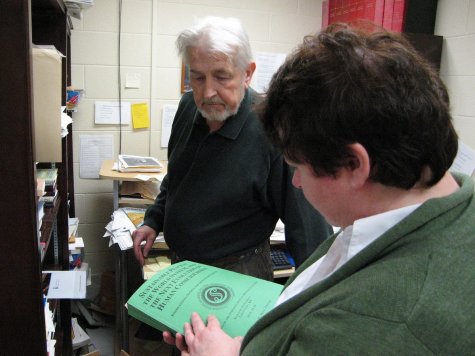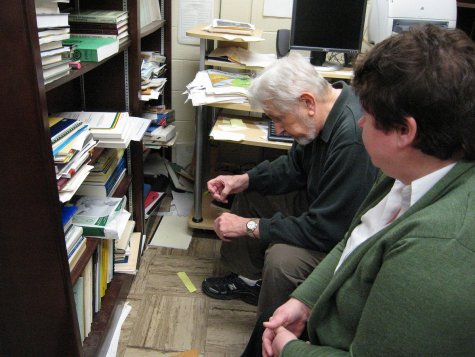I first met G.A. at the 1998 ISSS meeting in Atlanta, which I’ve cited to many as the single best educational experience of my life. G.A. had encouraged me, as well as Jennifer and Gary, to become more and more involved in the systems community over the years.
We spent the evening catching up on news, and reminiscing. In his home, the photographs and souvenirs of world travels suggested not only a man who was known internationally, but who might also have been a Southern rebel in his youth. The next morning, we moved a few things around to take G.A.’s car to the university.
While I first met G.A. in his role as ISSS president in 1998, he had long been a professor of accounting at Tennessee Tech since 1982. His office was in the College of Business at Johnson Hall.
We helped G.A. finish cleaning out his office. He had sent in his last paper for publication, and said that he wouldn’t be needing any more references. In the inner room were years of books not only on systems research, but also on accounting.
G.A. had a complete archive of systems research. Jennifer packed up some of the old artifacts that are hard to find.
In addition to the papers, there were videotape copies from James Grier Miller — from his time at the University of Louisville — when he interviewed key systems thinkers of the time. Gary took the tapes to coordinate with Louisville, later discovering that this collection would fill in a few of their gaps.
We cleaned out the last of the valuable content from the outer office. The photograph of James Grier Miller on the wall is a reminder of G.A.’s strong association, described in his 1989 book on Measurement and Interpretation in Accounting: A Living Systems Approach.
The school term was coming to an end. Outside G.A.’s office, a student stopped by to check his grades.
Extending some more southern hospitality, G.A. took us by Bobby Q’s to pick up some Tennessee barbeque.
G.A. didn’t have much of an appetite himself, but enjoyed watching us experience the local cuisine.
On the Saturday, we made a road trip up to the Highland Manor Winery, in Jamestown. I wouldn’t have expected a vineyard in Tenneesee. This is the oldest winery in state.
We sampled the variety of wines, including the muscadine that is unique to the region. We bought a few bottles that would be hard to fine elsewhere.
Gary, Jennifer and I were glad to spend weekend visiting with G.A. He was happy that he could rely on us to lead the systems community after he would be gone. In a few weeks, his extended family would gather to see him one last time. He passed away a few months later, in July, having lived a full life. The systems movement owes G. A. Swanson a large debt for rejuvenating the community
[Start a large-image lightbox screen show over this blog post (in a supported browser)]














